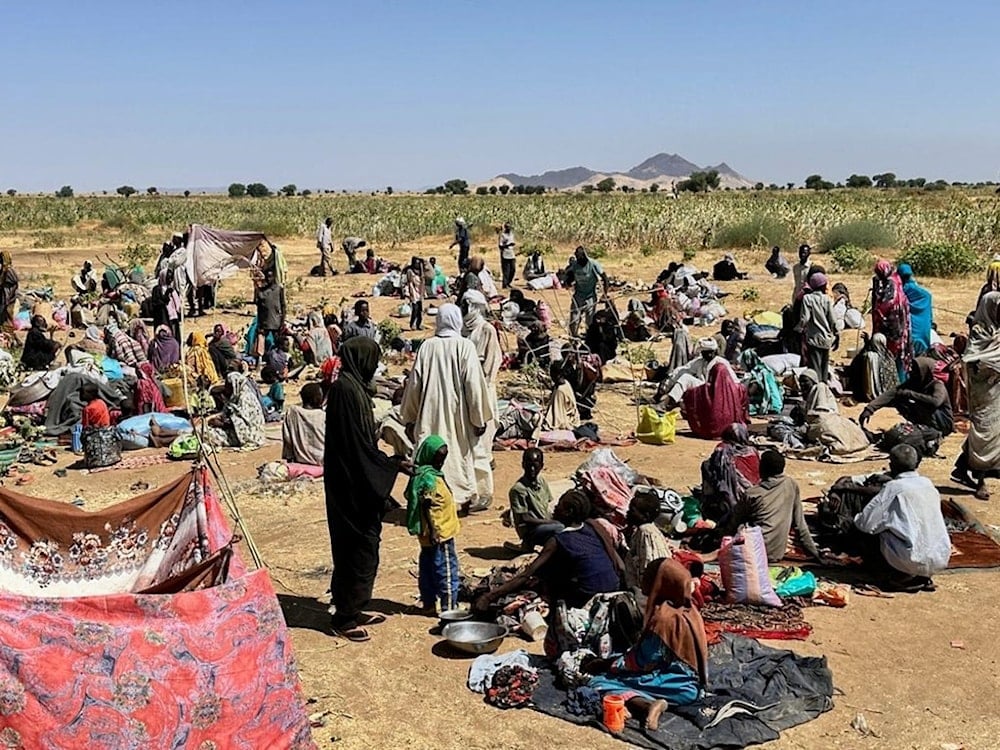Refugees recount killings and terror during RSF's El Fasher assault
Refugees fleeing the RSF's capture of El-Fasher recount killings, drone strikes, extortion, and mass civilian suffering as Sudan’s war drives unprecedented displacement and deepening humanitarian collapse.
-

This photo, released by The Norwegian Refugee Council (NRC), shows displaced families from el-Fasher at a displacement camp where they sought refuge from fighting between government forces and the RSF, in Tawila, Darfur region, Sudan, on October 31, 2025. (NRC via AP)
A wave of traumatized survivors has reached eastern Chad after fleeing the Rapid Support Forces’ (RSF) takeover of El Fasher, offering disturbing accounts of killings, drone strikes, extortion, and mass displacement as Sudan’s civil war rages on.
Sixteen-year-old Mounir Abderahmane arrived at the Tine transit camp after an 11-day trek across barren terrain. He had been at the Saudi hospital in El Fasher when RSF fighters entered the city in late October. His father, a soldier in the regular army, was being treated there after earlier clashes.
Abderahmane said the fighters rounded up medical staff before executing them. "They summoned seven nurses and ushered them into a room. We heard gunshots and I saw blood seeping out for under the door," he told AFP, struggling to hold his emotions. He fled immediately with his wounded father, who died on the route toward Chad several days later.
The fall of El Fasher on October 26 ended the army’s last foothold in the greater Darfur region after an 18-month siege. The RSF, whose lineage traces back to the Janjaweed militias responsible for mass killings two decades ago, has been widely accused of fresh abuses during the offensive.
Those who escaped described days of relentless bombardment. Hamid Souleymane Chogar, 53, said drone attacks surged on October 24, forcing residents into makeshift shelters with almost nothing to eat. "Every time I went up to get some air, I saw new corpses in the street, often those of local people I knew," he said. Taking advantage of a brief lull, he slipped out at night, crippled and carried on a cart that maneuvered between debris and bodies to avoid attention.
Fatal checkpoints
Many recounted encounters with deadly checkpoints. Mahamat Ahmat Abdelkerim said he and his family went into hiding when the headlights of an RSF vehicle pierced the darkness. His seventh child had already been killed by a drone strike days earlier. "There were about 10 bodies in there, all civilians," he said of the home they sheltered in, adding that "the blood was still oozing from their corpses."
Others fled amid explosions; Mouna Mahamat Oumour, 42, said her family was struck by shelling as they ran. "When I turned round, I saw my aunt's body torn to pieces. We covered her with a cloth and kept going," she said with tears in her eyes, adding, "We walked on without ever looking back."
As they pushed toward the outskirts of the city, escapees said they found bodies stacked in a deep trench dug by the RSF during the siege. Samira Abdallah Bachir, 29, described leading her three children across the ditch. She said they were forced to step carefully between the dead "so we wouldn't step on them" while climbing out.
Those who managed to get through the trench next had to face roadblocks. Witnesses reported rape, theft, and demands for cash ranging from $800 to $1,600 in exchange for safe passage. Many refugees traveled several days without food before reaching Tine, where international agencies are now struggling to make space for new arrivals. "People are being relocated from Tine to reduce crowding and make room for new refugees," said Ameni Rahmani of Doctors Without Borders.
The United Nations estimates nearly 90,000 people have fled El Fasher in the past two weeks alone. Their stories form part of the wider devastation from the ongoing power struggle between the RSF and the Sudanese army, a battle over territory and control of the country’s lucrative gold and oil sectors.
Since April 2023, the conflict has killed tens of thousands, uprooted almost 12 million, and generated what the UN calls the world’s largest hunger emergency.
Read more: Western foreign ministers decry RSF atrocities in Darfur’s El Fasher

 4 Min Read
4 Min Read








